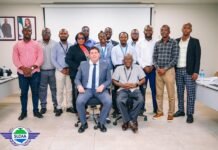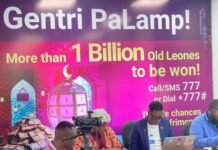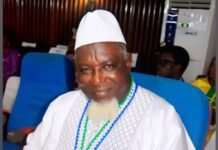By Amin Kef (Ranger)
The annual Political Partnership Dialogue between the Government of the Republic of Sierra Leone and the European Union (EU) concluded on December 10, 2024, at State House in Freetown, marking a milestone in the strengthening of bilateral ties. The dialogue produced significant outcomes, including the disbursement of EUR 11 million (275 million New Leones) under the EU’s “Nature Nourishes” Budget Support initiative.
The high-level dialogue was co-chaired by Sierra Leone’s President, H.E. Rtd. Brigadier General Dr. Julius Maada Bio and EU Ambassador Jacek Jankowski. Senior Government officials from Sierra Leone and Ambassadors from EU member states, including Ireland, Spain, Denmark, Germany and Hungary, also attended the event.
During the discussions, Ambassador Jacek Jankowski announced the release of the first installment of EUR 11 million, marking a major step forward in the EU’s support for Sierra Leone’s development goals. This funding is part of the broader “Nature Nourishes” initiative, which is aligned with both the EU’s Global Gateway strategy and Sierra Leone’s Medium-Term National Development Plan (2024-2030). The initiative aims to strengthen Sierra Leone’s resilience to internal and external shocks, enhance environmental protection, and improve educational outcomes.
In total, the EU has allocated EUR 80 million (2 billion New Leones) to Sierra Leone in 2024 as part of a wider development package. This funding reflects the EU’s commitment to supporting Sierra Leone’s growth and governance reforms.
The dialogue focused on four key thematic areas:
- Vibrant Democracy and Respect for the Rule of Law
- Sierra Leone’s Role in Regional and Global Affairs
- Good Public Administration
- Sound, Stable, and Competitive Business Environment
President Bio, in his opening remarks, praised the EU’s ongoing support for Sierra Leone, emphasizing the importance of the partnership in promoting democracy, transparency and sustainable development. He reiterated Sierra Leone’s commitment to enacting key reforms that foster good governance and uphold the rule of law.
The EU reaffirmed its support for Sierra Leone’s political reform agenda, particularly efforts to strengthen trust in the electoral system. Both sides also highlighted the EU’s support for the Electoral Commission of Sierra Leone and other key institutions that contribute to the country’s democratic processes.
The dialogue also underscored Sierra Leone’s increasing influence on the global stage, notably its role as a non-permanent member of the United Nations Security Council (UNSC). The EU commended Sierra Leone’s constructive role in regional stability, especially in addressing crises in the Sahel, the Great Lakes region and other global issues, including the conflicts in Ukraine, Israel and Palestine.
The two parties reaffirmed their shared commitment to upholding a rules-based international order, human rights and fundamental freedoms, and pledged to continue working together to promote peace and security, particularly in West Africa. They also stressed the importance of maritime security, given Sierra Leone’s strategic location along vital shipping routes.
Investment climate improvement was also a central theme of the dialogue, with the EU highlighting the need for genuine commitments to governance reforms, rule of law and anti-corruption measures. Both parties agreed that creating a conducive environment for business would help attract foreign investment to Sierra Leone.
At the conclusion of the dialogue, both Sierra Leone and the EU agreed to maintain ongoing dialogue and establish follow-up mechanisms to ensure the effective implementation of the agreements reached. This approach is designed to keep the partnership dynamic and responsive to Sierra Leone’s evolving needs, fostering sustainable development for the country.
Reflecting on the significance of the EU-Sierra Leone partnership, President Bio expressed gratitude for the continued support of the EU, the United States Ambassador, the British High Commissioner, and other development partners. He emphasized that political reforms, supported by these partners, are crucial to ensuring security, economic growth, and a thriving private sector in Sierra Leone.
“Through these reforms, we have attracted foreign investment in sectors such as mining, agriculture, and manufacturing, and Sierra Leone has become a net exporter of cooking oil and other products to our neighboring countries,” President Bio stated.
The President also highlighted the importance of fighting corruption, pointing to the work of the Anti-Corruption Commission (ACC), which has made significant progress in recovering stolen public funds and improving governance.
Sierra Leone’s return to the UNSC as a non-permanent member was another achievement the President emphasized, noting it as a symbol of the country’s post-war transformation. He reiterated the need for UN Security Council reforms to ensure fairer representation for Africa and vowed to continue advocating for those changes.
In his remarks, EU Ambassador, Jacek Jankowski, commended Sierra Leone’s progress and praised President Bio’s leadership. He noted that the partnership is built on shared priorities, including combating corruption, strengthening institutional capacity and improving governance. Ambassador Jacek Jankowski also stressed the EU’s commitment to supporting Sierra Leone in addressing climate change while promoting inclusive economic growth.
“The partnership between the EU and Sierra Leone remains strong and will continue to evolve as we work together to build a more prosperous and sustainable future for the country,” he concluded.




